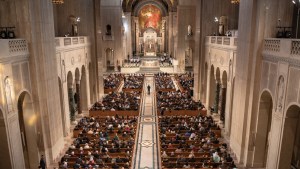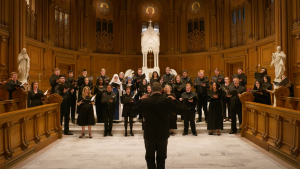Four years after its debut, Frank La Rocca’s Mass of the Americas has been recorded and released. The work, commissioned by the Benedict XVI Institute, is a faithful liturgical setting of the Catholic Mass, which honors the Blessed Virgin Mary under her titles of Our Lady of Guadalupe and Our Lady of the Immaculate Conception – Patroness of Mexico and all of the Americas, and the Patroness of the United States respectively.
This Mass of the Americas was the brainchild of San Francisco Archbishop Salvatore Cordileone, who worked closely with La Rocca, the Benedict XVI Institute’s resident composer. In a report on the institute’s website, La Rocca explained that he and the archbishop began with the idea of merging the structured tones of Western church music with those of traditional Mexican folk songs.
“He and I were both aware, in general terms, of the musical models used by missionary priests in Mexico, or later, California; they incorporated beloved popular tunes into the total experience of the Mass,” Frank said.
Honoring American cultures
Through Archbishop Cordileone’s guidance, La Rocca was directed to the traditional Mexican hymn, “La Guadalupana,” which he incorporated into the Mass, along with a portion in Nahuatl, the Aztec language, which Our Lady spoke to St. Juan Diego.
La Rocca revealed that this was one of the hardest aspects of the Mass to track down. Searches for a literal translation of the Ave Maria in the Nahuatl language were too varied and he had to delve into historical scholarly works for more information. He finally found a book from a 17th-century priest of mixed race who was fluent in Nahuatl. La Rocca explained:
“As a good pastor, he wanted to be sure his people knew what they were committing themselves to. So, he wrote a book in which he translates all of the teaching materials on the Sacrament of Confession as well as a number of the major prayers,” Frank recalled, “It had exactly what I needed. If his translation of the prayer in 1634 — being a native speaker in both languages — isn’t authentic, I don’t know what is.”
The music
The Mass of the Americas is an ambitious piece that delivered on all of its stated goals. It is a pristine work of modern sacred music that exhibits the best aspects of various Western styles. Some sections are clearly influenced by Gregorian chant, while others contain all the chordal colorings of the great Romantic era. Meanwhile, instruments like the marimba and the presence of Nahuatl lyrics bring a distinct Mesoamerican flair to the work.
Above all, however, La Rocca put the faith to the forefront in his composition. In an interview with National Catholic Register, he explained:
“Music at Mass is a ‘sacramental,’” La Rocca explained, “like vestments, incense, even church architecture — and its role is be a channel for the graces of the Mass and dispose the people to cooperate with them. Popular music styles with catchy rhythms and distracting modernist styles both draw attention to themselves and away from an interior experience of grace.”
Be sure to check out Aleteia’s photos of the Mass of the Americas 2019 concert at the Basilica of the National Shrine of the Immaculate Conception, in D.C..
Listen to the full Mass of the Americas on Spotify, below.



